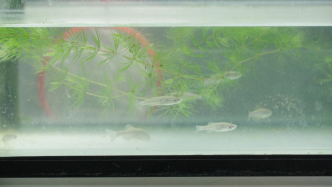
my country has successfully carried out "space fish farming", and the "fish astronaut" zebrafish is expected to go on an expedition again this year to assist scientists in conducting research on the impact of the space environment on the muscle and bone development of vertebrates.
This was learned by reporters from a recent briefing on the progress of science and application of space application systems of the Chinese Space Station held in Shanghai, which was hosted by the Space Application Engineering and Technology Center of the Chinese Academy of Sciences. According to Wang Gaohong, a researcher at the Institute of Hydrobiology of the Chinese Academy of Sciences, the "fish astronaut" zebrafish is a small tropical freshwater fish. Its genome is more than 70% similar to the human genome. It is an important model animal for conducting research in life sciences, health sciences, and environmental sciences, and is called the "little white mouse in the water." In April 2024, the "Tiangong Aquarium" containing 4 zebrafish and 4 grams of duckweed will enter the Chinese Space Station with the three astronauts of Shenzhou 18 and will be installed in the life ecological cabinet of the Questioning Module to carry out space experiments.
This is the first time that my country has established a self-circulating aquatic ecosystem in orbit. Scientists have simulated the material cycle of the biosphere through zebrafish and duckweed, achieving gas balance and long-term stable operation of the aquatic ecosystem. The ecosystem has been running stably on the space station for 43 days, setting the international record for the longest time a space aquatic ecosystem has been running in orbit.
"The zebrafish that boarded the Chinese space station for the first time not only lived well, but also laid eggs in orbit. This shows that the space self-circulating aquatic ecosystem established in orbit can serve as an experimental platform for zebrafish to assist scientists in studying the health of astronauts in space," said Wang Gaohong. "Zebrafish are expected to go on another expedition this year. The second 'Tiangong aquarium' that will enter the space station is planned to include 6 zebrafish and 6 grams of duckweed. Through zebrafish, scientists will focus on studying the effects of microgravity on the proteins in the muscles and bones of vertebrates."
Microgravity in space can cause a variety of pathological and physiological phenomena in the human body, such as cardiovascular dysfunction, decreased immune function, bone loss, muscle atrophy, endocrine disorders, etc. Its mechanism of action has always been one of the important scientific topics in the study of space biological effects. By studying zebrafish in space, it will help humans better and more comprehensively understand the impact of the space environment on genes, cells and life as a whole.